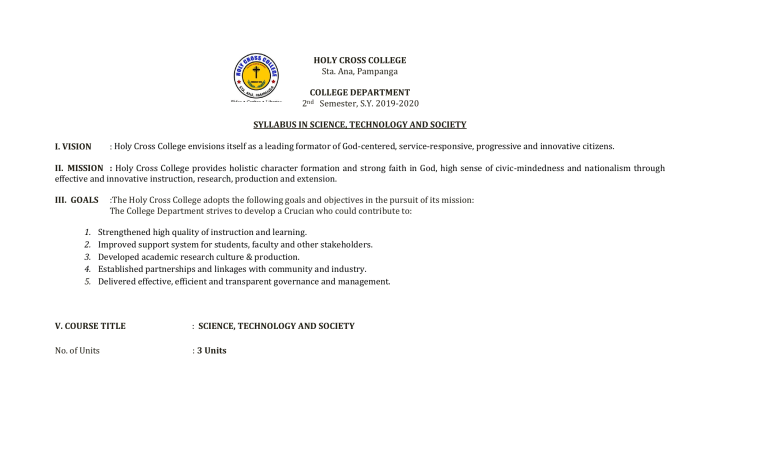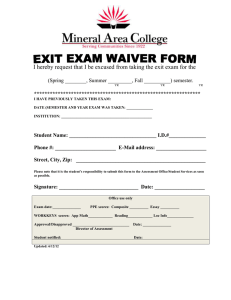
1 HOLY CROSS COLLEGE Sta. Ana, Pampanga COLLEGE DEPARTMENT 2nd Semester, S.Y. 2019-2020 SYLLABUS IN SCIENCE, TECHNOLOGY AND SOCIETY : Holy Cross College envisions itself as a leading formator of God-centered, service-responsive, progressive and innovative citizens. I. VISION II. MISSION : Holy Cross College provides holistic character formation and strong faith in God, high sense of civic-mindedness and nationalism through effective and innovative instruction, research, production and extension. III. GOALS 1. 2. 3. 4. 5. :The Holy Cross College adopts the following goals and objectives in the pursuit of its mission: The College Department strives to develop a Crucian who could contribute to: Strengthened high quality of instruction and learning. Improved support system for students, faculty and other stakeholders. Developed academic research culture & production. Established partnerships and linkages with community and industry. Delivered effective, efficient and transparent governance and management. V. COURSE TITLE : SCIENCE, TECHNOLOGY AND SOCIETY No. of Units : 3 Units VI. COURSE DESCRIPTION The course deals with interactions between science and technology, and social, cultural, political, and economic, contexts that shape and are shaped by them. (CMO No. 20, series of 2013) This interdisciplinary course engages students to control the realities brought about by science and technology in society. Such realities pervade the personal, the public, and the global aspects of our living things and are integral to human development. Scientific knowledge and technological development happen in the context of society with all its socio- political, cultural, economic and philosophical underpinnings at play. This course seeks to instill reflective knowledge in the students that they are able to live the good life and display ethical decision making in the face of scientific and technological advancement. This course includes mandatory topics on climate change and environmental awareness. VII. LEARNING OUTCOMES: At the end of the course, the students should be able to: A. KNOWLEDGE 1. Distinguish general concepts and historical events in science, technology, and society 2. Understand the science, technology, and the society and the human condition 3. Analyze specific issues in science, technology and society B. SKILLS 1. State the individuals that have contributions in intellectual revolution, nation buiding and science education in the Philippines 2. Analyze the uses of science, technology and the human condition 3. Create a infomercial (commercial that informs people) on how to conserve and protect the biodiversity C. VALUES 1. Appreciate the works of indivuals in relation to science, technology and society 2. Demonstrate the care and love of biodiversity COURSE OUTLINE AND TIMEFRAME Week 1-6 7-12 13- 18 Topics I. General Concepts and Historical Events in Science, Technology, and Society • Intellectual Revolutions that defined Society • Science, Technology and Nation- building • Science Education in the Philippines • Indigenous Science and Technology in the Philippines II. Science, Technology, Society and the Human Condition • Human Flourishing • Technology as a Way of Revealing • The Good Life • When Technology and Humanity cross III. Specific Isssues in Science, Technology, and Society • The Information Age • Biodiversity and Healthy Society • Genetically Modified Organisms; Science, Health and Politics • The Nano World • The Aspects of Gene Therapy • Climate Change VIII. COURSE CONTENT Desired Student Learning Outcomes The student shall been able to: • Provide the students an overview of the course subject’s content, requirements and activities. • Introduce the students to the scope and nature of the course subject The student shall been able to: I. • Explain how science and technology affected the society and vice versa; • Identify inventions and discoveries that changed the world over the course history • Discuss the scientific and technological developments in the Philippines • Explain how the Intellectual Revolution changed the way how humans see the world Course Content/Duration Orientation: House Rules Grading System Requirements Class Organization Course Description I. General Concepts and Historical Events in Science, Technology, and Society • Intellectual Revolutions that defined Society • Science, Technology and Nationbuilding • Science Education in the Philippines • Indigenous Science and Technology in the Philippines Instructional Delivery Oral Presentation Lecture Evidence of Performance Assessment Tools Class Interaction Submission of the answers and explanation. Classroom Interaction Group Scores Individual Scores Assessment Tools: Analytic Rubric Group Scores Individual Scores Major Exams The student shall been able to: • Analyze Technology as a way of revealing • Examine modern technology and its role in human flourishing • Examine shared contents that make up the good life to come up with innovative and creative solutions to contemporary issues guided by ethical standards • Discuss the importance of human rights in the face of changing social conditions and technological development PRELIMINARY EXAMINATION II. Science, Technology, Society and the Human Condition • Human Flourishing • Technology as a Way of Revealing • The Good Life • When Technology and Humanity cross Graphic Organizers Individual Recitation Classroom Interaction Test Results Assessment Tools: Analytic Rubric Group Scores Individual Scores Major Exams Oral Presentation Simulations Informercial (Create a video campaign that shows conservation and preservation of environment) Recitation Classroom Interaction Submission of the profile of the organization of every group Submission of the Campaign Video Assessment Tools: Analytic Rubric Group Scores Individual Scores Major Exams MIDTERM EXAMINATION The student shall been able to: • Discuss the Information Age • State the relationship of Biodiversity and Healthy Society • Identify the causes of Climate Change • State the things about Nano World and GMO (Genetically Modified Organisms • Discuss the ethics, III. Specific Isssues in Science, Technology, and Society • The Information Age • Biodiversity and Healthy Society • Genetically Modified Organisms; Science, Health and Politics • The Nano World • The Aspects of Gene Therapy • Climate Change • • • implications, and potential future impacts of GMOs Examine the Aspects of Gene Therapy Provide pieces of evidence to affirm the presence of climate change Conserve and Preserve Environment FINAL EXAMINATION X. COURSE REFERENCES Textbook: Title: Science, Technology and Society Reprinted: December 2017 Published, copyrighted 2018 and distributed by Rex Book Store, Inc. with main office at 856 Nicanor Reyes Sr. St., Sampaloc Manila/Tel. Nos.; 735-1364, 736- 0567 Authors:Jane Patria Javier Serfica, Greg Tabios Pawilen, Bernardo Nicolas Caslib, Jr., Eden Joy Pastor Alata Other References: Textbook: Title: Science, Technology, and Society Published in 2018 by C and E Publishing, Inc. 839 EDSA, South Triangle, Quezon City, Tel No.; (02) 929- 5088, Email; info@cebookshop.com, Copyright 2018 by C and E Publishing, Inc., Authors: Daniel J. McNamara, Vida Mia S. Valverde, and Ramon B. Beleno III XI. PERFORMANCE INDICATOR AND EVIDENCES OF PERFORMANCE Course Performance Indicators • • • • • Discuss the Information Age State the relationship of Biodiversity and Healthy Society Identify the causes of Climate Change State the things about Nano World and GMO (Genetically Modified Organisms Examine the Aspects of Gene Therapy Evidences of Performance Performance Standard Oral Presentation Simulations Informercial and Vlog (Create a video campaign that shows conservation and preservation of environment) Other topic for Vlog and Informercial (Environmental Issues and Trends) Most liked video 10% Most liked video 10% Punctuality 10% Content 30% Cooperation of the Group 20% Effects, Choice of Song, Effects and etc 30% TOTAL: 100% XII. GRADING SYSTEM Periodic Grade = Class Standing (60%) + Periodic Examination (40%) Final Grade = Prelim Grade + Midterm Grade + Final Grade XIII. COURSE REQUIREMENTS: Major Exam, Oral Presentation, Group Presentation, Role Playing, Group projects, Laboratory, Term Paper XIV. COURSE POLICIES AND GUIDELINES: Please refer to the Student Handbook. 1. Attendance Because this is a classroom, mandatory attendance will be reduced to project presentation days. As per college policy, students are expected to complete assignments on-time. While some projects span the entire semester, others are due on specific dates throughout the semester. Ten percent (10%) of the total points available (or a minimum of 1 point) are deducted from a student's grade on a project when it is received after the stated due time (usually 11:00 a.m.) on the due date unless otherwise stated on the rubric for the individual project/assignment. An additional 5% (or a minimum of 1 point) is deducted for each day the project/assignment is late. Work that is more than one week late will not be accepted without a doctor's note submitted to the instructor or proof of other emergency beyond the student's control. Be sure to consult the rubric for the individual project for more complete details. Students who are unable to complete the work during the semester are eligible for an Incomplete only if the reason fits the College's guidelines for an incomplete. If an Incomplete is granted, it will automatically convert to the grade of F if the work is not completed by the end of the following semester. 2. Tests and Make-ups All quizzes for this course must be completed. The final examination will be delivered during class schedule. 3. Extra Credit. Students are expected to complete the projects as required for the class and to do the best they can on each project throughout the semester. Thus, it is the policy of the instructor not to give additional assignments for extra credit for students who wish to pull up their grades at the end of semester. Every attempt is made to provide a complete syllabus that provides an accurate overview of the courses. However, circumstances and events may make it necessary for the instructor to modify the syllabus during the semester. This may depend, in part, on the progress, needs and experiences of the students. 4. Students participate in the discussion, and answer the discussion questions. Failure to do those in 3 weeks will mean dropping from the course. 5. Requirements such as assignments/projects should be submitted/posted on or before the given deadline. 6. Coordinate with the professor, using various modes given on concerns/problems regarding the requirements. 7. Non-submission of requirements will be incomplete from the course. Prepared by: Verified by: Approved by: PAUL JUSTINE R. CENETA, LPT Instructor ROSEMARIE B. TAPIA, LPT . Coordinator, GENED DR. PABLITO P. GANTAN, JR Dean, CASEd


